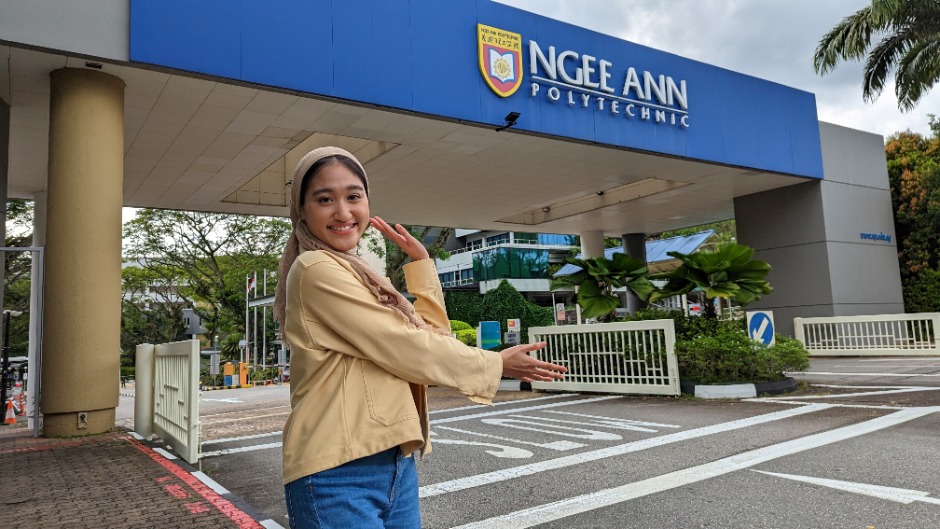What do hunting down crooks and saving coral reefs have in common?
They are both real-life applications of Molecular Biotechnology. Combining knowledge of biochemistry, genetics and microbiology, this is a growing field of Science that has the potential to solve many problems that we face today – such as food security, diseases, crime… and bleached coral reefs.
This was precisely what attracted John Liu, a recent graduate of Ngee Ann Polytechnic (NP), to the field of biotechnology in the first place.
John always had a keen interest in Science. In his secondary school Biology lessons, he was intrigued by the concept of genetic engineering and how medicinal products could be derived from micro-organisms. The possibilities of biotechnology excited him.
“I remember reading about climate change and how it affects marine life,” he shared. “Some scientists proposed using genetic engineering to help corals tolerate higher temperatures, so that they can survive when the oceans become warmer.
“I was blown away by how the solution to such a big problem could be found in the very heart of the organism, in its genes.”
What helped John make up his mind to pursue Molecular Biotechnology after Secondary school was a hands-on session in NP’s Life Science Lab. In Secondary 3, he had the opportunity to take part in NP’s Forensic Science Lab Enhancement Programme.
For an afternoon, he got to try his hand at analysing hair fibres under the microscope and extracting the DNA from a blood sample under the direction of a forensics science specialist.
“I knew the lab was where I wanted to be,” John said. “What clinched the deal was NP’s Molecular Biotech course had an elective in marine biology!”
EAE: Going in with a Plan
For John, the Early Admissions Exercise (EAE) was like a safety net.
“Biotech is a very competitive course,” he shared. “My results are alright, but I think EAE is a safety net just in case my grades do not make the cut-off point. If I can get two shots to get into the course I want, why not?”
In preparing for the EAE interview, John put together his portfolio, comprising his CCA records, testimonials from his teachers and certificates from the Science workshops and competitions he had joined.
More importantly, he thought carefully about what he was going to say.
“I spent some time reflecting about my decision and organised my thoughts in three main points – the past, present and future.
- Past: What experiences do I have that are related to this course? What inspired me or brought me here today?
- Present: What do I hope to learn and gain now, from the course at NP? I researched the modules offered and read up on current developments in Biotech.
- Future: What do I want to do after I get my diploma? I looked up relevant university courses, companies and career options for Biotech graduates.
“Although the questions at the interview were not exactly the same, I could use what I had prepared and answer a lot more confidently!”
It definitely pays to be well-prepared. John recalled that when he mentioned the use of gene editing in corals as something he was interested in, the panel probed further and asked him how he would conduct the experiment if he were the scientist working on the project.
“Because I had read up on the topic, I was able to give an outline of the steps in conducting genetic engineering,” he explained. “It was also evidence that I had more than a cursory interest in the field. The interviewer told me afterwards that he was impressed with how I was able to answer that question!”
John’s preparation did not go to waste – he was successful and secured a place at NP’s Diploma in Molecular Biotechnology course (MBIO).
From cultivating microbes…
From the start of his journey in MBIO, John had many opportunities to explore his interest in the invisible processes that govern life on earth – inside our cells.
Besides lectures, there were also weekly practical sessions in which he could practise the skills needed for research.
He shares, “There was actually a lot more hands-on work than I had expected, which is great! In fact, I think about a third of my time in NP was spent in the lab!”
John enjoyed what he was doing so much that he volunteered as a research assistant in his lecturer’s lab during the polytechnic holidays.
“I think one advantage about learning in polytechnic is that our lecturers do not just teach,” he explained. “They are also researchers working on actual, current projects – and they have a lot of authentic experiences to share with us about the industry.”
During his first stint as a voluntary research assistant, John helped with a study that aimed to produce collagen from bacteria to be used in therapy for joint pain.
In the next holiday, he got the chance to work on a project to create anti-microbial coatings for stainless steel plates used in water treatment plants. This could potentially help prevent the growth of harmful bacteria and make the maintenance work of the treatment plants easier and safer for workers.

Lab work requires precision – and sometimes, a lot of patience!
His work may not look terribly exciting from the outside, he says – he spent most of his time examining bacterial cultures in petri dishes and running tests on them – but John appreciated the opportunity to learn alongside the researchers and be involved in projects that could help improve lives.
He also got the chance to pick up advanced theories and techniques that he had not yet learnt in class.
He reflected, “Through the work at my lecturer’s lab, I learned that research is not always about coming up with new ground-breaking technology. Sometimes, it is about applying a technology that we already know about in new situations to solve new problems – and that’s very exciting.”
… To growing vegetables
That’s not to say life for John was completely lab-dominated during his three years.
He found that polytechnic had a lot to offer outside of the academics as well. In fact, he was involved in three different interest groups during his time in NP!
He joined NP’s Community Service Interest Group and the Young Scientist Interest Group, where he could network with like-minded people and also participate in ad hoc projects and events that sparked his interest.
Most of his time however was spent in the Horticulture Club in NP, in which he served as a committee member.
“Gardening is a hobby for me,” he joked. “We actually managed to establish an edible garden. It was fun to grow things that I can see and eat for once.”
Outside of NP, John also volunteered as a Cadet Inspector in the NPCC Unit back at his secondary school, where he helped to guide his juniors.
“I believe my secondary school and my CCA especially helped me grow to be more disciplined and confident as a person, which led me to where I am today,” he said. “That’s why I still go back regularly and contribute my time to guide my juniors.”
After NP – The journey continues
John just graduated from NP this April [2020], but he has already mapped out his next steps towards his dreams of being a full-fledged molecular biology researcher.
He applied for and was awarded the A*Star National Science Scholarship and intends to pursue a degree in Molecular Science overseas after his National Service.
In the long term, he hopes to complete a PhD and set up his own research lab in Singapore that will make use of biotechnology to tackle issues like health, food security, and yes, climate change.
“To me, research is about understanding the world and how we can use this knowledge to solve problems. I hope that my work in biotechnology research will be my way of giving back to the community.”





.jpg)
